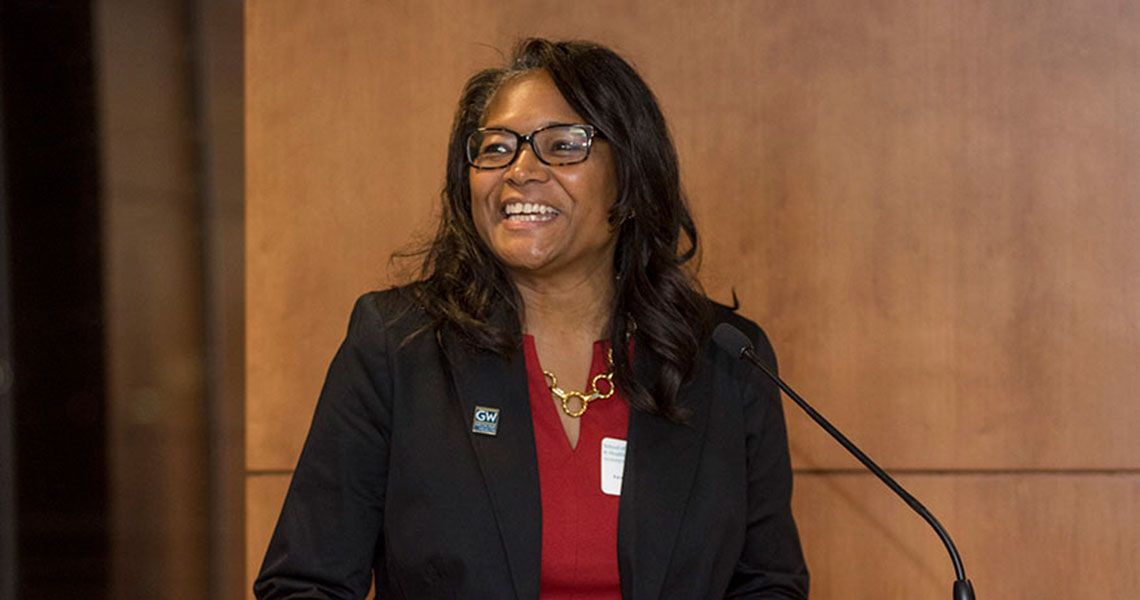Every October, the nation celebrates Physician Assistants (PA) Week. To mark the annual celebration, the GW School of Medicine and Health Sciences (SMHS) hosts an awards reception to honor individuals for their dedication to the profession.
Karen A. Wright, Ph.D., PA-C, interim chair, program director, and assistant professor of physician assistant studies at SMHS, began the night by thanking the crowd of alumni, preceptors, faculty, staff, students, family, and friends for their support.
“Although the profession won’t officially turn 50 until next year, it continues to grow both in size and demand,” she said. “I would say the GW PA program is definitely thriving.”
The awards that followed recognized the honorees “for their steadfast commitment to the PA profession and to PA education,” Wright said.
Howard Straker, MPH, PA-C, co-director of the GW PA/M.P.H. program and assistant professor of PA studies at SMHS, received the first honor, the Distinguished Public Service Award.
In introducing Straker, Debra Herrmann, M.S.H.S., M.P.H., PA-C, assistant professor of PA studies at SMHS, spoke about his work as a physician assistant, as an educator, and as a leader.
After graduating from Yale in 1986, Straker began his professional life caring for inmates at Sing Sing Correctional Facility. His clinical career includes practicing in emergency and adolescent medicine settings in New York, Alaska, North Carolina, and Maryland.
Straker established an adolescent medicine clinic in the Brownsville Multi-Service Family Health Center in Brooklyn, New York; became the first student appointed to the American Academy of Physician Assistants committee; and served as president of the District of Columbia Academy of PAs, spearheading revisions in PA practice regulations.
Following Hurricane Katrina in 2005, Straker organized a national spring break for students to help displaced residents rebuild their homes in New Orleans.
After taking the podium, Straker joked about his long list of accomplishments. “That was a lot. I don’t even remember doing all those things,” he quipped.
“It’s an honor to be recognized by your colleagues and … any one of our faculty could have gotten this,” he added.
Public service “is personal,” he said, explaining that his devotion to helping others comes from watching his mother’s service to her family and to her community.
Eva Straker always put the well-being of her children before her own, Straker said, a commitment that extended to her New York community when he and his siblings went off to begin their careers. She earned her bachelor’s degree in human services, and later New York City Mayor David Dinkins appointed her to serve as a non-salaried commissioner to the New York Commission on Human Rights.
“Up until her 80s, she continued working with her local community board. I would call … at 9:30 at night and there’s no answer, and then at 10 o’clock and there’s no answer,” Straker said. He would finally hear from her around 10:15 p.m.; she would just be getting back from a meeting.
“[H]opefully we take our patient care personally, hopefully there will be a time in all of our lives where we extend … our services to help an organization, an institution, a neighborhood, a community or our society,” he said.
Surinderpal Sodhi, M.D., received the second honor, the Dr. Jules Cahan Distinguished Teaching Award.
Sodhi runs Perry Point VA Medical Center’s ICU, Medical Service, and Respiratory Unit, and has been a preceptor for the GW PA program for about 25 years, said Lisa Alexander, Ed.D. ’03, M.P.H. ’89, P.A. ’79, professor of physician assistant studies at SMHS.
Sodhi moved to the United States in 1977 after graduating from medical school in India. He attended Louisiana State University Medical School in New Orleans for his residency and later served a pulmonary critical care fellowship at Rutgers Medical School in New Jersey. Sodhi became director of the ICU at the Nashville VA before moving to Maryland to work at Perry Point.
“For all of our students at Perry Point, I’ve noticed that they always come back with glowing remarks and admiration for their preceptor,” Alexander said.
Sodhi, the father of three SMHS M.D. program alumni, told the crowd of the impact his father had on his medical career. His father served as a doctor during World War II in North Africa. While there, he came across doctors serving under U.S. Army Gen. George S. Patton. He was so impressed by them, Sodhi said, that he wanted his children to study in America.
Because of his father’s influence, Sodhi makes it his mission to take care of veterans. “All of the Second World War veterans are wonderful people,” he said, “and with every veteran I serve I am looking for my father.”
“If you all come [to Perry Point],” he told the students in the crowd, “we’ll try to teach you as much as we can. There’s so much to learn.”
The last honor of the night, the Terrence E. Barr Memorial Scholarship, was presented by John Colletta, Ph.D., Barr’s partner of nine years.
Barr, after serving in the Marine Corps Battalion during Vietnam, enrolled at the University of Florida to become a PA, which at that time was a new profession in the world of medicine. Colletta said being a PA was Barr’s “calling.”
“Terry was an outstanding PA,” Colletta said, “empathetic, altruistic, generous, and smart like all of you.”
The scholarship was awarded to Joel Wenger, a student in GW’s joint PA-M.P.H. program. Prior to enrolling at GW, Wenger volunteered as a translator and medical assistant at a free clinic. In addition, from 2014–16, he served as the PA representative to the steering committee of the student-run GW Healing Clinic.
“I had no idea,” Wenger said, surprised to receive the scholarship. “It’s an honor.”



